Developing Professional Identity and Practice: A Hotel Russell Report
VerifiedAdded on 2021/01/02
|11
|3017
|387
Report
AI Summary
This report delves into the realm of professional identity and practice, using Hotel Russell as a case study. It begins by outlining the key benefits of ongoing professional development for stakeholders like employees and employers, emphasizing motivation, a skilled workforce, and enhanced competitiveness. The report then explores professional employer expectations, focusing on personal presentation, personal skills, hard skills, and soft skills. It identifies the abilities, skills, and competencies required for an HR professional, including teamwork, project management, human resource knowledge, and employee relations. Various learning theories and approaches, such as the behaviorist approach, VARK learning styles, and on-job training, are analyzed for personal and professional development. A detailed professional development plan is presented to enhance chosen skills and competencies. The report concludes with a simulated job interview for a service industry role, evaluating the candidate's CV and the interviewer's questions, and assessing the strengths and weaknesses of the interview process.
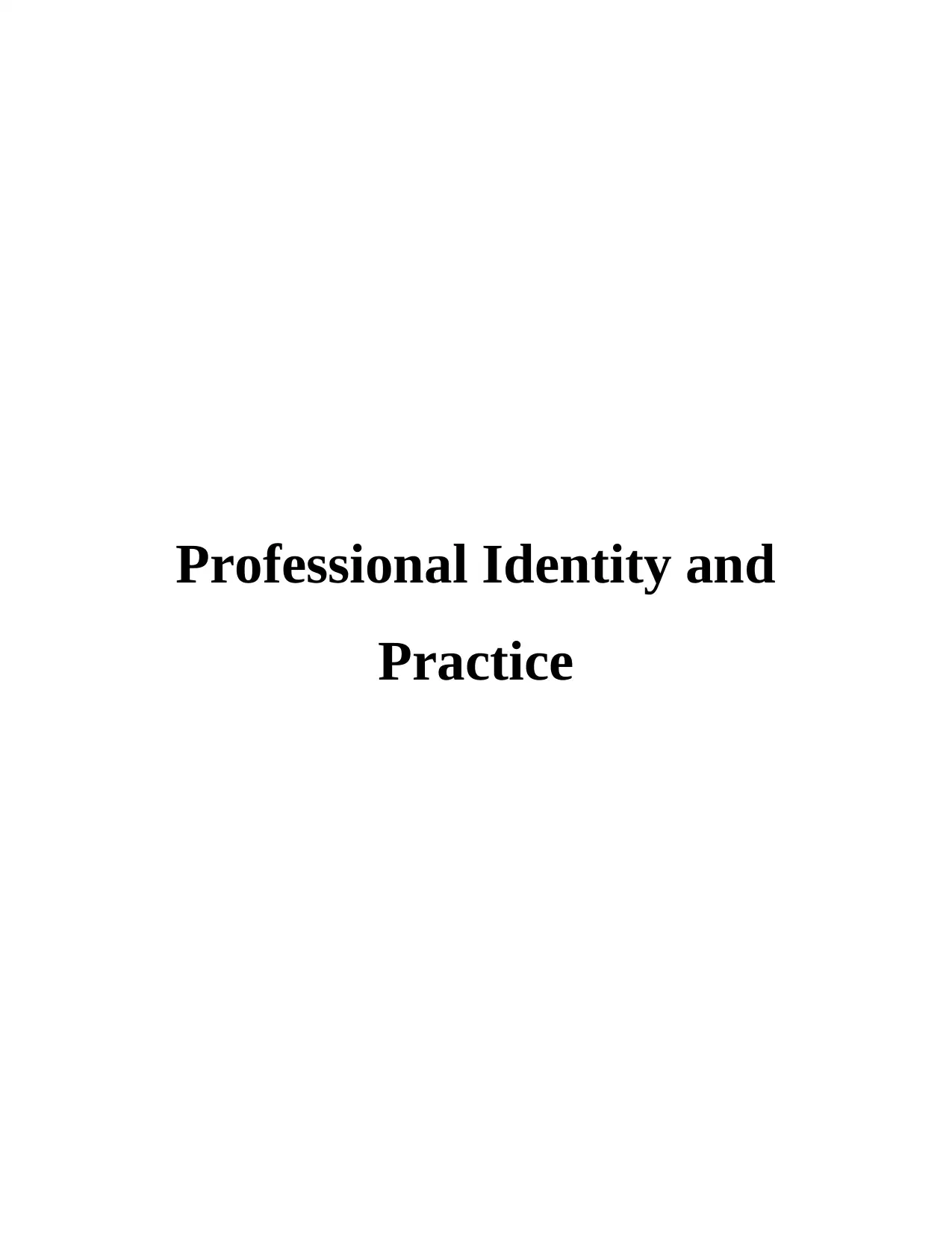
Professional Identity and
Practice
Practice
Paraphrase This Document
Need a fresh take? Get an instant paraphrase of this document with our AI Paraphraser
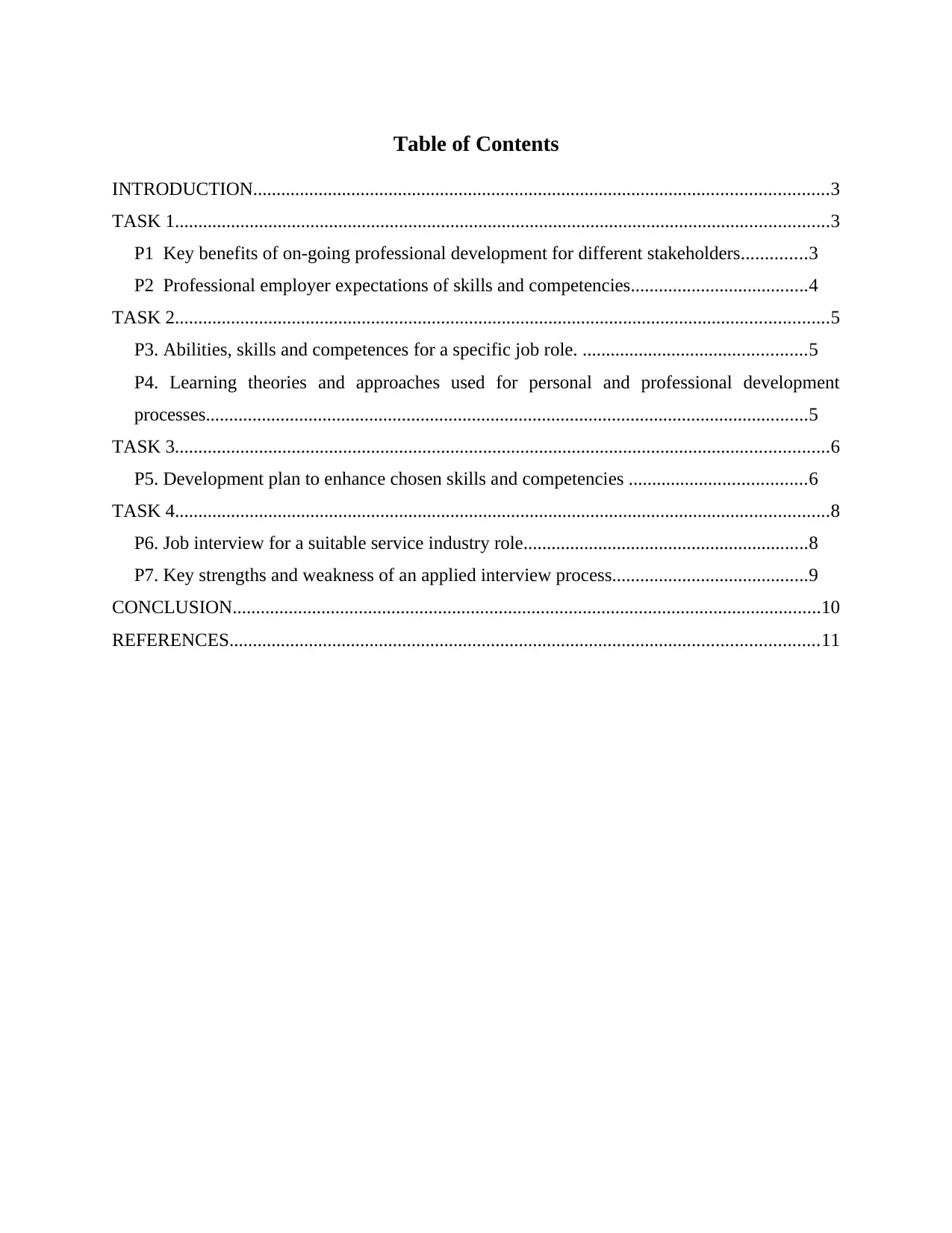
Table of Contents
INTRODUCTION...........................................................................................................................3
TASK 1............................................................................................................................................3
P1 Key benefits of on-going professional development for different stakeholders..............3
P2 Professional employer expectations of skills and competencies......................................4
TASK 2............................................................................................................................................5
P3. Abilities, skills and competences for a specific job role. ................................................5
P4. Learning theories and approaches used for personal and professional development
processes.................................................................................................................................5
TASK 3............................................................................................................................................6
P5. Development plan to enhance chosen skills and competencies ......................................6
TASK 4............................................................................................................................................8
P6. Job interview for a suitable service industry role.............................................................8
P7. Key strengths and weakness of an applied interview process..........................................9
CONCLUSION..............................................................................................................................10
REFERENCES..............................................................................................................................11
INTRODUCTION...........................................................................................................................3
TASK 1............................................................................................................................................3
P1 Key benefits of on-going professional development for different stakeholders..............3
P2 Professional employer expectations of skills and competencies......................................4
TASK 2............................................................................................................................................5
P3. Abilities, skills and competences for a specific job role. ................................................5
P4. Learning theories and approaches used for personal and professional development
processes.................................................................................................................................5
TASK 3............................................................................................................................................6
P5. Development plan to enhance chosen skills and competencies ......................................6
TASK 4............................................................................................................................................8
P6. Job interview for a suitable service industry role.............................................................8
P7. Key strengths and weakness of an applied interview process..........................................9
CONCLUSION..............................................................................................................................10
REFERENCES..............................................................................................................................11
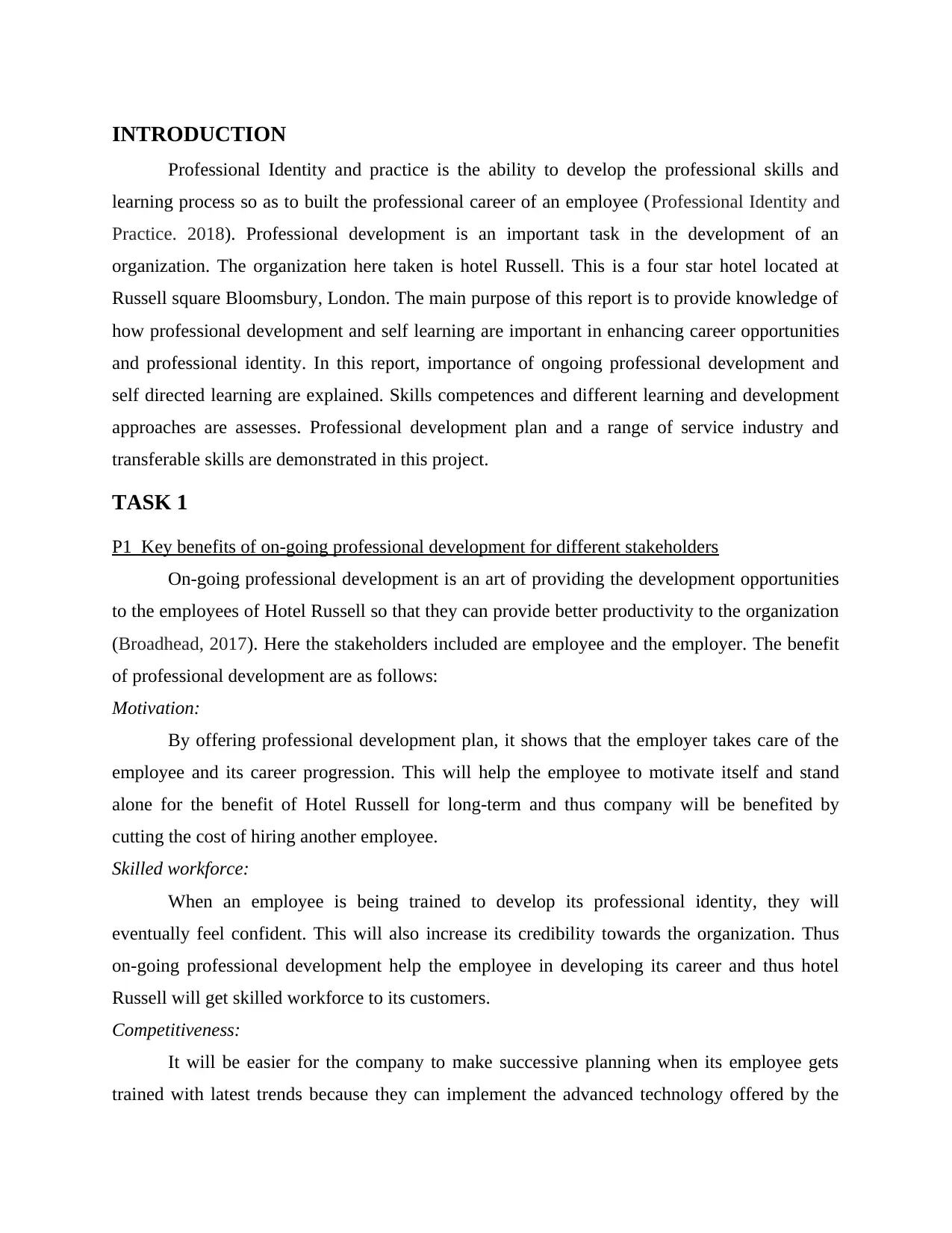
INTRODUCTION
Professional Identity and practice is the ability to develop the professional skills and
learning process so as to built the professional career of an employee (Professional Identity and
Practice. 2018). Professional development is an important task in the development of an
organization. The organization here taken is hotel Russell. This is a four star hotel located at
Russell square Bloomsbury, London. The main purpose of this report is to provide knowledge of
how professional development and self learning are important in enhancing career opportunities
and professional identity. In this report, importance of ongoing professional development and
self directed learning are explained. Skills competences and different learning and development
approaches are assesses. Professional development plan and a range of service industry and
transferable skills are demonstrated in this project.
TASK 1
P1 Key benefits of on-going professional development for different stakeholders
On-going professional development is an art of providing the development opportunities
to the employees of Hotel Russell so that they can provide better productivity to the organization
(Broadhead, 2017). Here the stakeholders included are employee and the employer. The benefit
of professional development are as follows:
Motivation:
By offering professional development plan, it shows that the employer takes care of the
employee and its career progression. This will help the employee to motivate itself and stand
alone for the benefit of Hotel Russell for long-term and thus company will be benefited by
cutting the cost of hiring another employee.
Skilled workforce:
When an employee is being trained to develop its professional identity, they will
eventually feel confident. This will also increase its credibility towards the organization. Thus
on-going professional development help the employee in developing its career and thus hotel
Russell will get skilled workforce to its customers.
Competitiveness:
It will be easier for the company to make successive planning when its employee gets
trained with latest trends because they can implement the advanced technology offered by the
Professional Identity and practice is the ability to develop the professional skills and
learning process so as to built the professional career of an employee (Professional Identity and
Practice. 2018). Professional development is an important task in the development of an
organization. The organization here taken is hotel Russell. This is a four star hotel located at
Russell square Bloomsbury, London. The main purpose of this report is to provide knowledge of
how professional development and self learning are important in enhancing career opportunities
and professional identity. In this report, importance of ongoing professional development and
self directed learning are explained. Skills competences and different learning and development
approaches are assesses. Professional development plan and a range of service industry and
transferable skills are demonstrated in this project.
TASK 1
P1 Key benefits of on-going professional development for different stakeholders
On-going professional development is an art of providing the development opportunities
to the employees of Hotel Russell so that they can provide better productivity to the organization
(Broadhead, 2017). Here the stakeholders included are employee and the employer. The benefit
of professional development are as follows:
Motivation:
By offering professional development plan, it shows that the employer takes care of the
employee and its career progression. This will help the employee to motivate itself and stand
alone for the benefit of Hotel Russell for long-term and thus company will be benefited by
cutting the cost of hiring another employee.
Skilled workforce:
When an employee is being trained to develop its professional identity, they will
eventually feel confident. This will also increase its credibility towards the organization. Thus
on-going professional development help the employee in developing its career and thus hotel
Russell will get skilled workforce to its customers.
Competitiveness:
It will be easier for the company to make successive planning when its employee gets
trained with latest trends because they can implement the advanced technology offered by the
⊘ This is a preview!⊘
Do you want full access?
Subscribe today to unlock all pages.

Trusted by 1+ million students worldwide
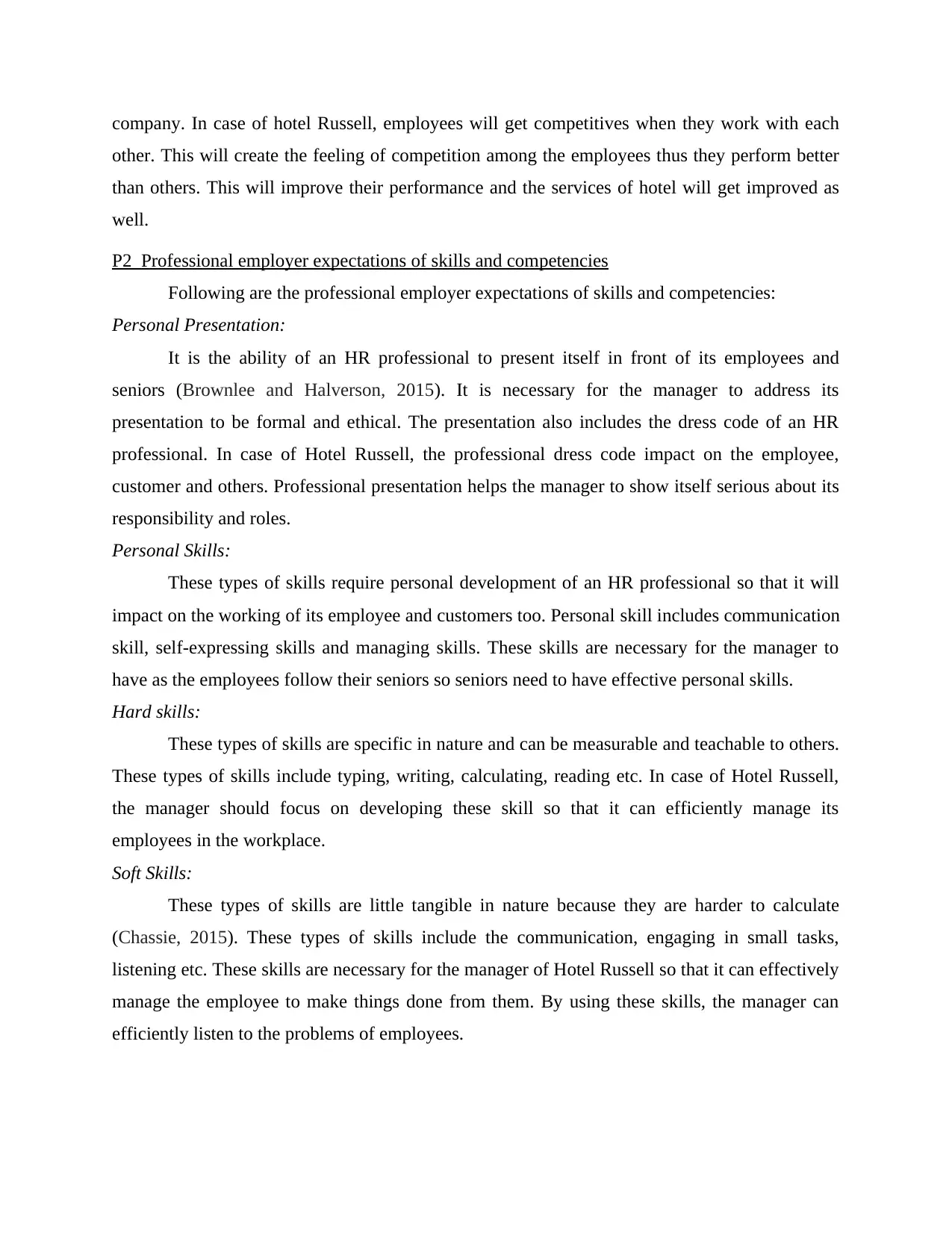
company. In case of hotel Russell, employees will get competitives when they work with each
other. This will create the feeling of competition among the employees thus they perform better
than others. This will improve their performance and the services of hotel will get improved as
well.
P2 Professional employer expectations of skills and competencies
Following are the professional employer expectations of skills and competencies:
Personal Presentation:
It is the ability of an HR professional to present itself in front of its employees and
seniors (Brownlee and Halverson, 2015). It is necessary for the manager to address its
presentation to be formal and ethical. The presentation also includes the dress code of an HR
professional. In case of Hotel Russell, the professional dress code impact on the employee,
customer and others. Professional presentation helps the manager to show itself serious about its
responsibility and roles.
Personal Skills:
These types of skills require personal development of an HR professional so that it will
impact on the working of its employee and customers too. Personal skill includes communication
skill, self-expressing skills and managing skills. These skills are necessary for the manager to
have as the employees follow their seniors so seniors need to have effective personal skills.
Hard skills:
These types of skills are specific in nature and can be measurable and teachable to others.
These types of skills include typing, writing, calculating, reading etc. In case of Hotel Russell,
the manager should focus on developing these skill so that it can efficiently manage its
employees in the workplace.
Soft Skills:
These types of skills are little tangible in nature because they are harder to calculate
(Chassie, 2015). These types of skills include the communication, engaging in small tasks,
listening etc. These skills are necessary for the manager of Hotel Russell so that it can effectively
manage the employee to make things done from them. By using these skills, the manager can
efficiently listen to the problems of employees.
other. This will create the feeling of competition among the employees thus they perform better
than others. This will improve their performance and the services of hotel will get improved as
well.
P2 Professional employer expectations of skills and competencies
Following are the professional employer expectations of skills and competencies:
Personal Presentation:
It is the ability of an HR professional to present itself in front of its employees and
seniors (Brownlee and Halverson, 2015). It is necessary for the manager to address its
presentation to be formal and ethical. The presentation also includes the dress code of an HR
professional. In case of Hotel Russell, the professional dress code impact on the employee,
customer and others. Professional presentation helps the manager to show itself serious about its
responsibility and roles.
Personal Skills:
These types of skills require personal development of an HR professional so that it will
impact on the working of its employee and customers too. Personal skill includes communication
skill, self-expressing skills and managing skills. These skills are necessary for the manager to
have as the employees follow their seniors so seniors need to have effective personal skills.
Hard skills:
These types of skills are specific in nature and can be measurable and teachable to others.
These types of skills include typing, writing, calculating, reading etc. In case of Hotel Russell,
the manager should focus on developing these skill so that it can efficiently manage its
employees in the workplace.
Soft Skills:
These types of skills are little tangible in nature because they are harder to calculate
(Chassie, 2015). These types of skills include the communication, engaging in small tasks,
listening etc. These skills are necessary for the manager of Hotel Russell so that it can effectively
manage the employee to make things done from them. By using these skills, the manager can
efficiently listen to the problems of employees.
Paraphrase This Document
Need a fresh take? Get an instant paraphrase of this document with our AI Paraphraser
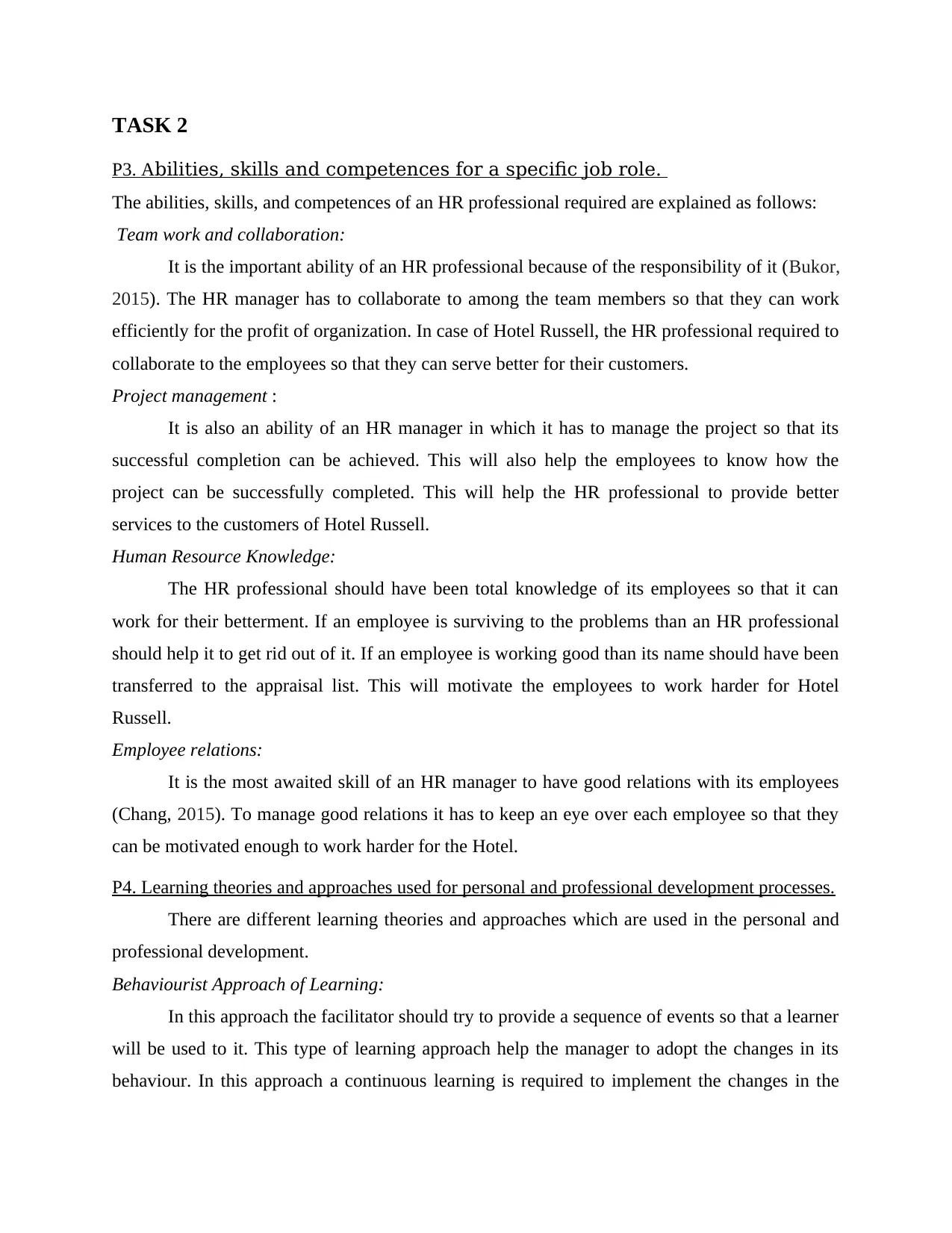
TASK 2
P3. Abilities, skills and competences for a specific job role.
The abilities, skills, and competences of an HR professional required are explained as follows:
Team work and collaboration:
It is the important ability of an HR professional because of the responsibility of it (Bukor,
2015). The HR manager has to collaborate to among the team members so that they can work
efficiently for the profit of organization. In case of Hotel Russell, the HR professional required to
collaborate to the employees so that they can serve better for their customers.
Project management :
It is also an ability of an HR manager in which it has to manage the project so that its
successful completion can be achieved. This will also help the employees to know how the
project can be successfully completed. This will help the HR professional to provide better
services to the customers of Hotel Russell.
Human Resource Knowledge:
The HR professional should have been total knowledge of its employees so that it can
work for their betterment. If an employee is surviving to the problems than an HR professional
should help it to get rid out of it. If an employee is working good than its name should have been
transferred to the appraisal list. This will motivate the employees to work harder for Hotel
Russell.
Employee relations:
It is the most awaited skill of an HR manager to have good relations with its employees
(Chang, 2015). To manage good relations it has to keep an eye over each employee so that they
can be motivated enough to work harder for the Hotel.
P4. Learning theories and approaches used for personal and professional development processes.
There are different learning theories and approaches which are used in the personal and
professional development.
Behaviourist Approach of Learning:
In this approach the facilitator should try to provide a sequence of events so that a learner
will be used to it. This type of learning approach help the manager to adopt the changes in its
behaviour. In this approach a continuous learning is required to implement the changes in the
P3. Abilities, skills and competences for a specific job role.
The abilities, skills, and competences of an HR professional required are explained as follows:
Team work and collaboration:
It is the important ability of an HR professional because of the responsibility of it (Bukor,
2015). The HR manager has to collaborate to among the team members so that they can work
efficiently for the profit of organization. In case of Hotel Russell, the HR professional required to
collaborate to the employees so that they can serve better for their customers.
Project management :
It is also an ability of an HR manager in which it has to manage the project so that its
successful completion can be achieved. This will also help the employees to know how the
project can be successfully completed. This will help the HR professional to provide better
services to the customers of Hotel Russell.
Human Resource Knowledge:
The HR professional should have been total knowledge of its employees so that it can
work for their betterment. If an employee is surviving to the problems than an HR professional
should help it to get rid out of it. If an employee is working good than its name should have been
transferred to the appraisal list. This will motivate the employees to work harder for Hotel
Russell.
Employee relations:
It is the most awaited skill of an HR manager to have good relations with its employees
(Chang, 2015). To manage good relations it has to keep an eye over each employee so that they
can be motivated enough to work harder for the Hotel.
P4. Learning theories and approaches used for personal and professional development processes.
There are different learning theories and approaches which are used in the personal and
professional development.
Behaviourist Approach of Learning:
In this approach the facilitator should try to provide a sequence of events so that a learner
will be used to it. This type of learning approach help the manager to adopt the changes in its
behaviour. In this approach a continuous learning is required to implement the changes in the
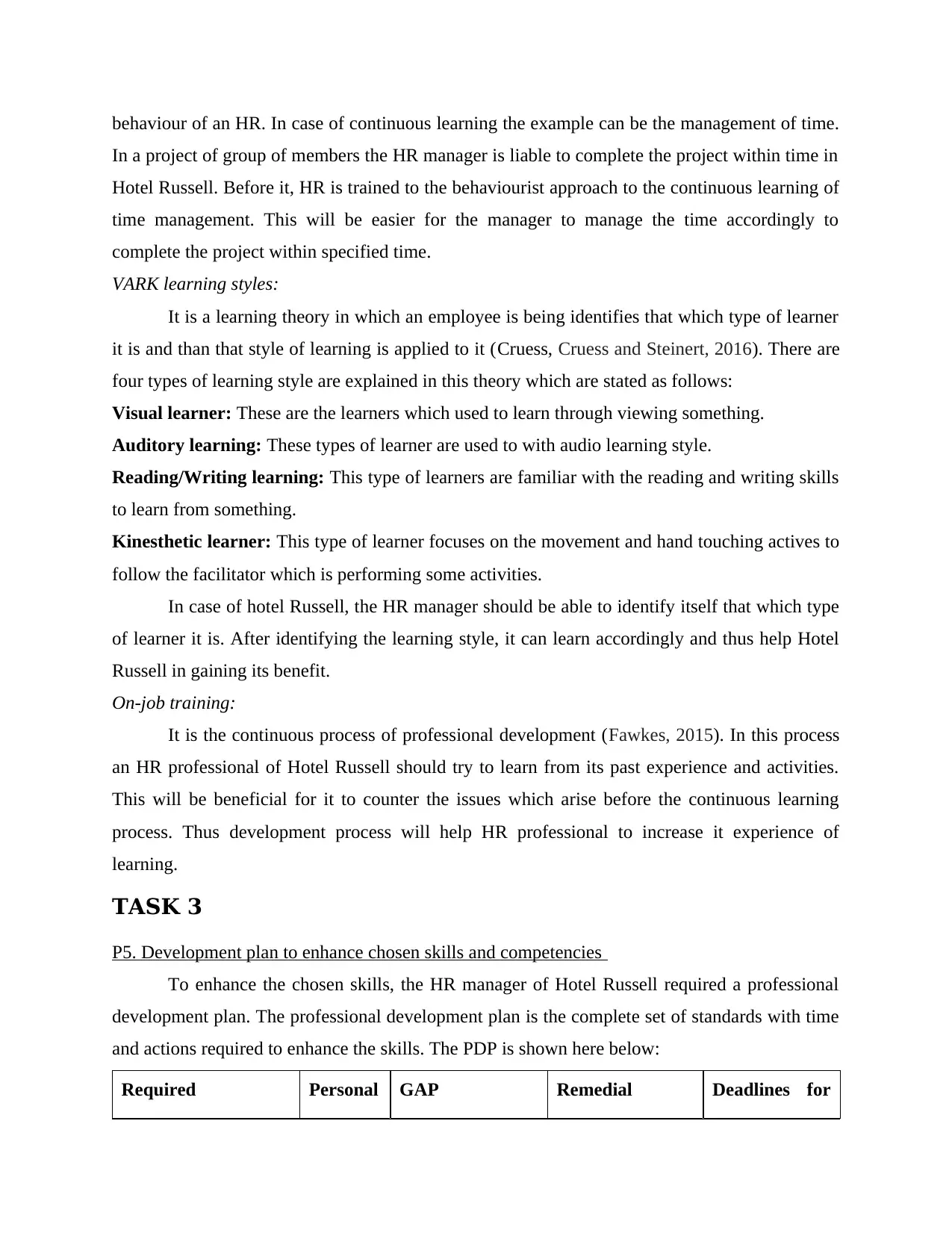
behaviour of an HR. In case of continuous learning the example can be the management of time.
In a project of group of members the HR manager is liable to complete the project within time in
Hotel Russell. Before it, HR is trained to the behaviourist approach to the continuous learning of
time management. This will be easier for the manager to manage the time accordingly to
complete the project within specified time.
VARK learning styles:
It is a learning theory in which an employee is being identifies that which type of learner
it is and than that style of learning is applied to it (Cruess, Cruess and Steinert, 2016). There are
four types of learning style are explained in this theory which are stated as follows:
Visual learner: These are the learners which used to learn through viewing something.
Auditory learning: These types of learner are used to with audio learning style.
Reading/Writing learning: This type of learners are familiar with the reading and writing skills
to learn from something.
Kinesthetic learner: This type of learner focuses on the movement and hand touching actives to
follow the facilitator which is performing some activities.
In case of hotel Russell, the HR manager should be able to identify itself that which type
of learner it is. After identifying the learning style, it can learn accordingly and thus help Hotel
Russell in gaining its benefit.
On-job training:
It is the continuous process of professional development (Fawkes, 2015). In this process
an HR professional of Hotel Russell should try to learn from its past experience and activities.
This will be beneficial for it to counter the issues which arise before the continuous learning
process. Thus development process will help HR professional to increase it experience of
learning.
TASK 3
P5. Development plan to enhance chosen skills and competencies
To enhance the chosen skills, the HR manager of Hotel Russell required a professional
development plan. The professional development plan is the complete set of standards with time
and actions required to enhance the skills. The PDP is shown here below:
Required Personal GAP Remedial Deadlines for
In a project of group of members the HR manager is liable to complete the project within time in
Hotel Russell. Before it, HR is trained to the behaviourist approach to the continuous learning of
time management. This will be easier for the manager to manage the time accordingly to
complete the project within specified time.
VARK learning styles:
It is a learning theory in which an employee is being identifies that which type of learner
it is and than that style of learning is applied to it (Cruess, Cruess and Steinert, 2016). There are
four types of learning style are explained in this theory which are stated as follows:
Visual learner: These are the learners which used to learn through viewing something.
Auditory learning: These types of learner are used to with audio learning style.
Reading/Writing learning: This type of learners are familiar with the reading and writing skills
to learn from something.
Kinesthetic learner: This type of learner focuses on the movement and hand touching actives to
follow the facilitator which is performing some activities.
In case of hotel Russell, the HR manager should be able to identify itself that which type
of learner it is. After identifying the learning style, it can learn accordingly and thus help Hotel
Russell in gaining its benefit.
On-job training:
It is the continuous process of professional development (Fawkes, 2015). In this process
an HR professional of Hotel Russell should try to learn from its past experience and activities.
This will be beneficial for it to counter the issues which arise before the continuous learning
process. Thus development process will help HR professional to increase it experience of
learning.
TASK 3
P5. Development plan to enhance chosen skills and competencies
To enhance the chosen skills, the HR manager of Hotel Russell required a professional
development plan. The professional development plan is the complete set of standards with time
and actions required to enhance the skills. The PDP is shown here below:
Required Personal GAP Remedial Deadlines for
⊘ This is a preview!⊘
Do you want full access?
Subscribe today to unlock all pages.

Trusted by 1+ million students worldwide
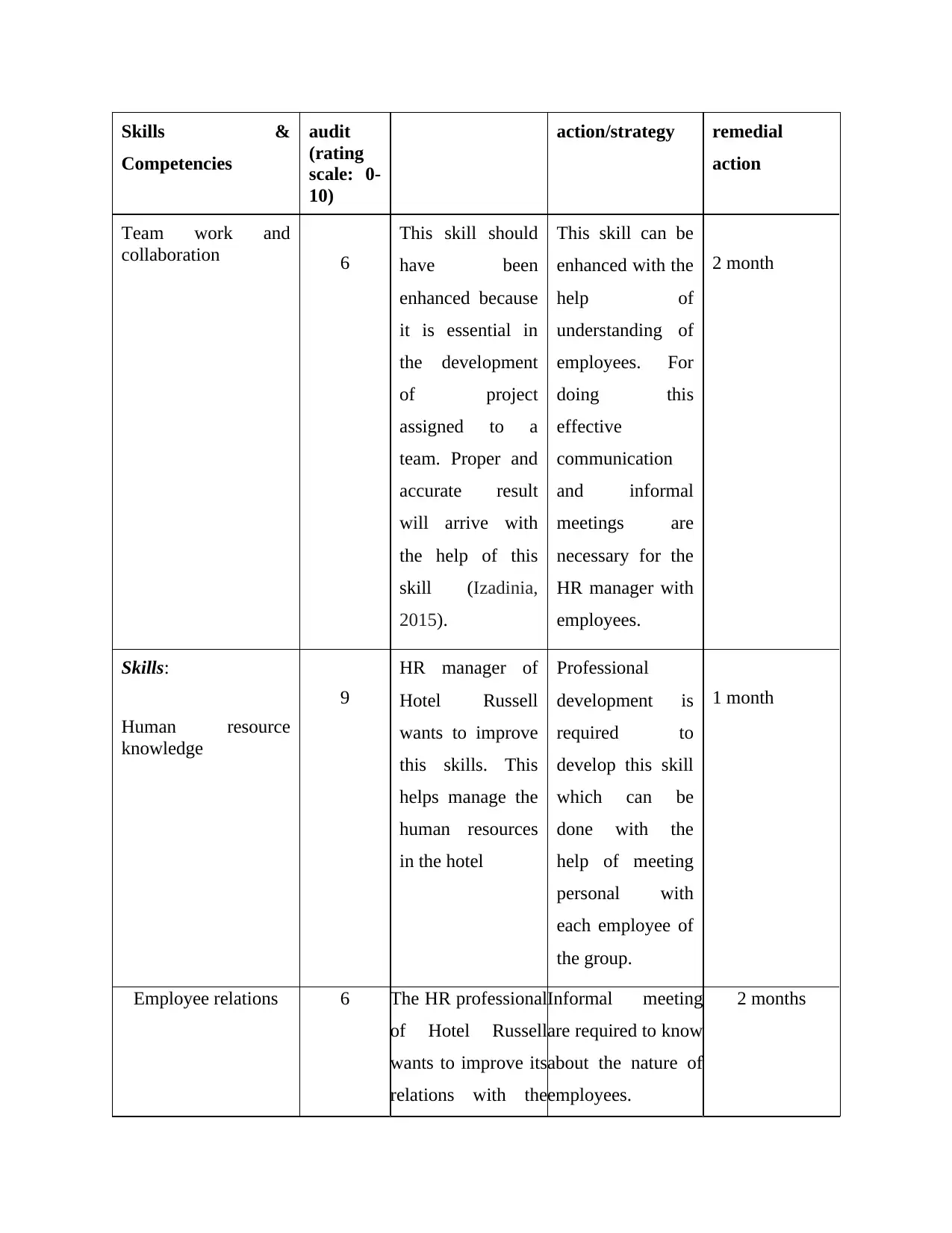
Skills &
Competencies
audit
(rating
scale: 0-
10)
action/strategy remedial
action
Team work and
collaboration 6
This skill should
have been
enhanced because
it is essential in
the development
of project
assigned to a
team. Proper and
accurate result
will arrive with
the help of this
skill (Izadinia,
2015).
This skill can be
enhanced with the
help of
understanding of
employees. For
doing this
effective
communication
and informal
meetings are
necessary for the
HR manager with
employees.
2 month
Skills:
Human resource
knowledge
9
HR manager of
Hotel Russell
wants to improve
this skills. This
helps manage the
human resources
in the hotel
Professional
development is
required to
develop this skill
which can be
done with the
help of meeting
personal with
each employee of
the group.
1 month
Employee relations 6 The HR professional
of Hotel Russell
wants to improve its
relations with the
Informal meeting
are required to know
about the nature of
employees.
2 months
Competencies
audit
(rating
scale: 0-
10)
action/strategy remedial
action
Team work and
collaboration 6
This skill should
have been
enhanced because
it is essential in
the development
of project
assigned to a
team. Proper and
accurate result
will arrive with
the help of this
skill (Izadinia,
2015).
This skill can be
enhanced with the
help of
understanding of
employees. For
doing this
effective
communication
and informal
meetings are
necessary for the
HR manager with
employees.
2 month
Skills:
Human resource
knowledge
9
HR manager of
Hotel Russell
wants to improve
this skills. This
helps manage the
human resources
in the hotel
Professional
development is
required to
develop this skill
which can be
done with the
help of meeting
personal with
each employee of
the group.
1 month
Employee relations 6 The HR professional
of Hotel Russell
wants to improve its
relations with the
Informal meeting
are required to know
about the nature of
employees.
2 months
Paraphrase This Document
Need a fresh take? Get an instant paraphrase of this document with our AI Paraphraser
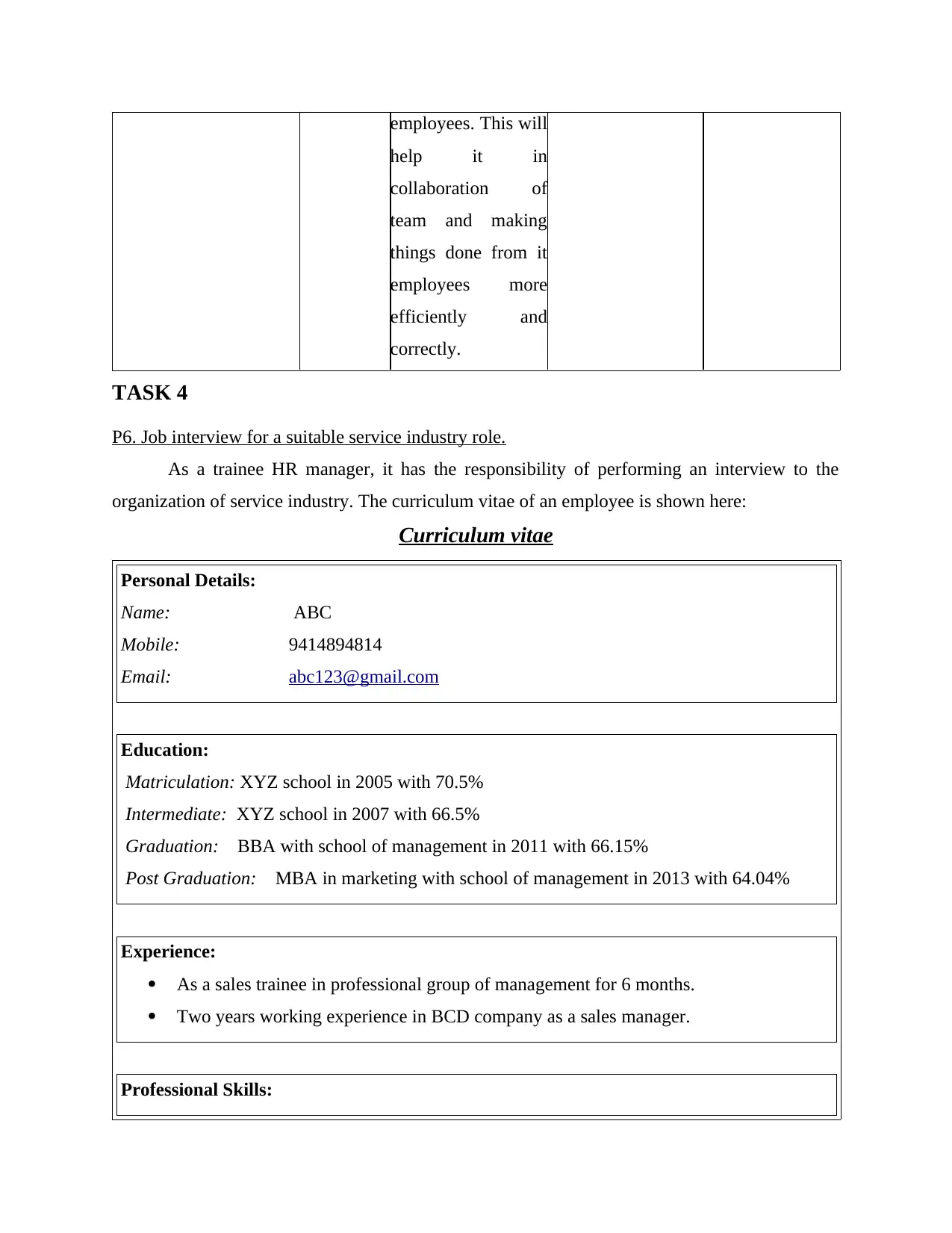
employees. This will
help it in
collaboration of
team and making
things done from it
employees more
efficiently and
correctly.
TASK 4
P6. Job interview for a suitable service industry role.
As a trainee HR manager, it has the responsibility of performing an interview to the
organization of service industry. The curriculum vitae of an employee is shown here:
Curriculum vitae
Personal Details:
Name: ABC
Mobile: 9414894814
Email: abc123@gmail.com
Education:
Matriculation: XYZ school in 2005 with 70.5%
Intermediate: XYZ school in 2007 with 66.5%
Graduation: BBA with school of management in 2011 with 66.15%
Post Graduation: MBA in marketing with school of management in 2013 with 64.04%
Experience:
As a sales trainee in professional group of management for 6 months.
Two years working experience in BCD company as a sales manager.
Professional Skills:
help it in
collaboration of
team and making
things done from it
employees more
efficiently and
correctly.
TASK 4
P6. Job interview for a suitable service industry role.
As a trainee HR manager, it has the responsibility of performing an interview to the
organization of service industry. The curriculum vitae of an employee is shown here:
Curriculum vitae
Personal Details:
Name: ABC
Mobile: 9414894814
Email: abc123@gmail.com
Education:
Matriculation: XYZ school in 2005 with 70.5%
Intermediate: XYZ school in 2007 with 66.5%
Graduation: BBA with school of management in 2011 with 66.15%
Post Graduation: MBA in marketing with school of management in 2013 with 64.04%
Experience:
As a sales trainee in professional group of management for 6 months.
Two years working experience in BCD company as a sales manager.
Professional Skills:
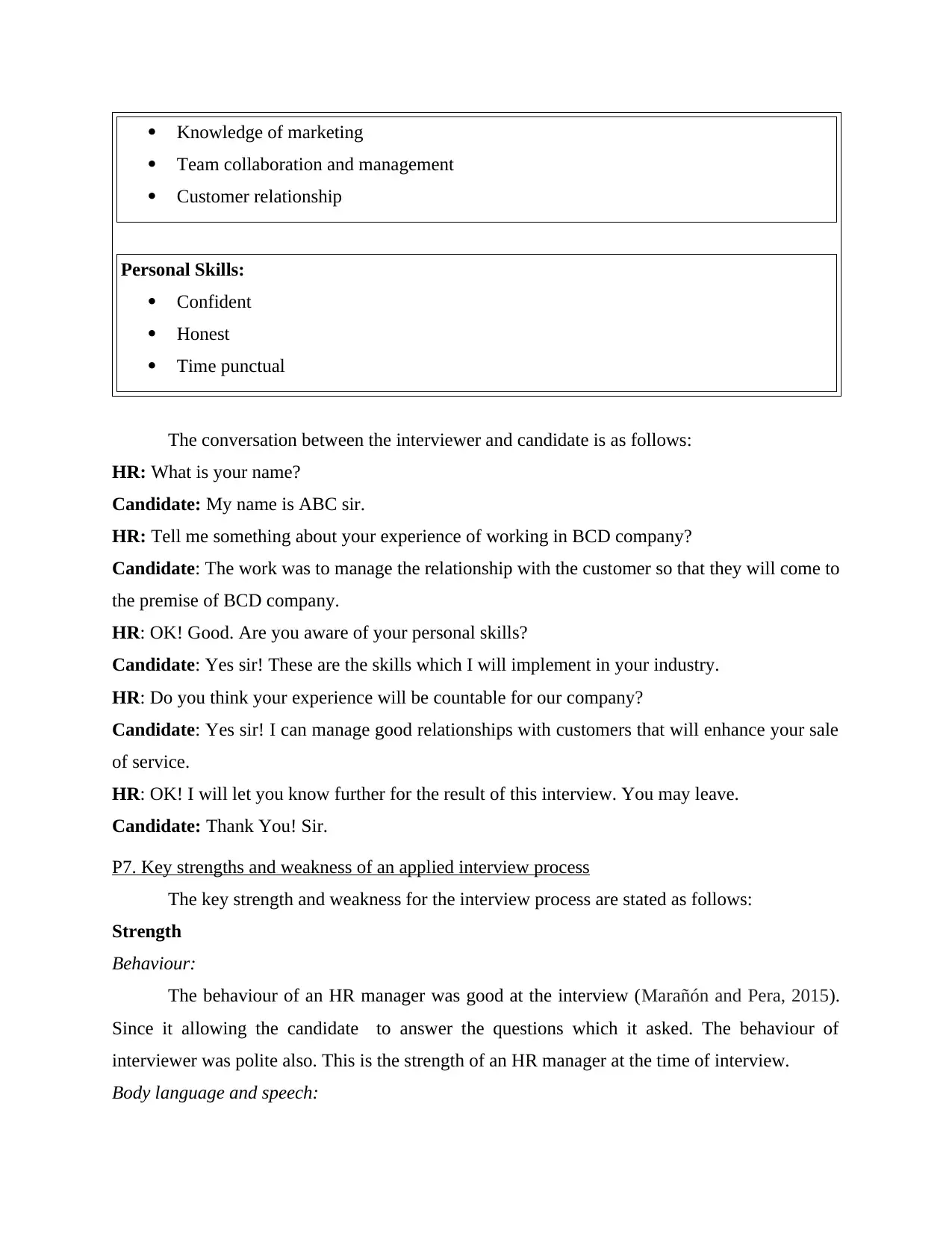
Knowledge of marketing
Team collaboration and management
Customer relationship
Personal Skills:
Confident
Honest
Time punctual
The conversation between the interviewer and candidate is as follows:
HR: What is your name?
Candidate: My name is ABC sir.
HR: Tell me something about your experience of working in BCD company?
Candidate: The work was to manage the relationship with the customer so that they will come to
the premise of BCD company.
HR: OK! Good. Are you aware of your personal skills?
Candidate: Yes sir! These are the skills which I will implement in your industry.
HR: Do you think your experience will be countable for our company?
Candidate: Yes sir! I can manage good relationships with customers that will enhance your sale
of service.
HR: OK! I will let you know further for the result of this interview. You may leave.
Candidate: Thank You! Sir.
P7. Key strengths and weakness of an applied interview process
The key strength and weakness for the interview process are stated as follows:
Strength
Behaviour:
The behaviour of an HR manager was good at the interview (Marañón and Pera, 2015).
Since it allowing the candidate to answer the questions which it asked. The behaviour of
interviewer was polite also. This is the strength of an HR manager at the time of interview.
Body language and speech:
Team collaboration and management
Customer relationship
Personal Skills:
Confident
Honest
Time punctual
The conversation between the interviewer and candidate is as follows:
HR: What is your name?
Candidate: My name is ABC sir.
HR: Tell me something about your experience of working in BCD company?
Candidate: The work was to manage the relationship with the customer so that they will come to
the premise of BCD company.
HR: OK! Good. Are you aware of your personal skills?
Candidate: Yes sir! These are the skills which I will implement in your industry.
HR: Do you think your experience will be countable for our company?
Candidate: Yes sir! I can manage good relationships with customers that will enhance your sale
of service.
HR: OK! I will let you know further for the result of this interview. You may leave.
Candidate: Thank You! Sir.
P7. Key strengths and weakness of an applied interview process
The key strength and weakness for the interview process are stated as follows:
Strength
Behaviour:
The behaviour of an HR manager was good at the interview (Marañón and Pera, 2015).
Since it allowing the candidate to answer the questions which it asked. The behaviour of
interviewer was polite also. This is the strength of an HR manager at the time of interview.
Body language and speech:
⊘ This is a preview!⊘
Do you want full access?
Subscribe today to unlock all pages.

Trusted by 1+ million students worldwide
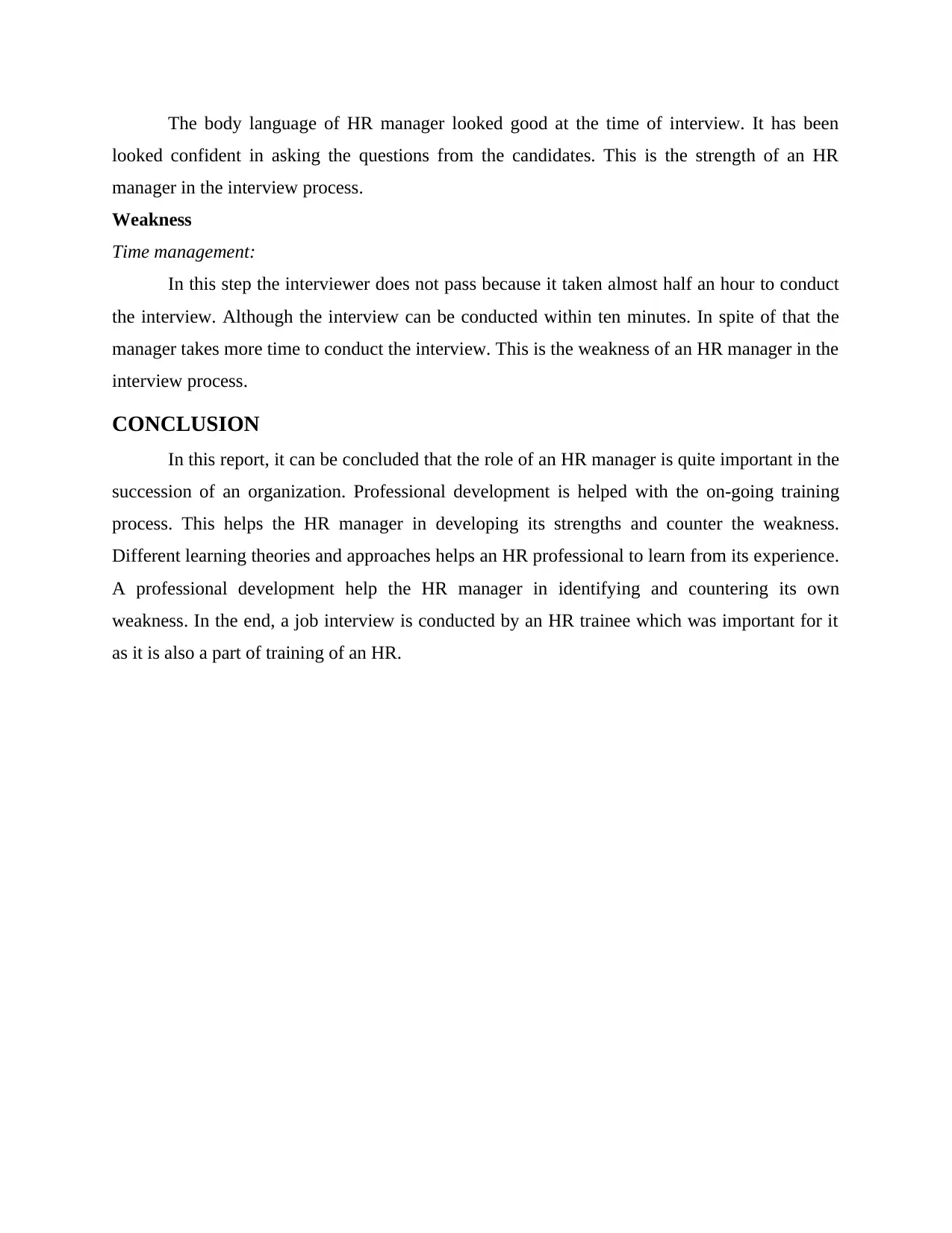
The body language of HR manager looked good at the time of interview. It has been
looked confident in asking the questions from the candidates. This is the strength of an HR
manager in the interview process.
Weakness
Time management:
In this step the interviewer does not pass because it taken almost half an hour to conduct
the interview. Although the interview can be conducted within ten minutes. In spite of that the
manager takes more time to conduct the interview. This is the weakness of an HR manager in the
interview process.
CONCLUSION
In this report, it can be concluded that the role of an HR manager is quite important in the
succession of an organization. Professional development is helped with the on-going training
process. This helps the HR manager in developing its strengths and counter the weakness.
Different learning theories and approaches helps an HR professional to learn from its experience.
A professional development help the HR manager in identifying and countering its own
weakness. In the end, a job interview is conducted by an HR trainee which was important for it
as it is also a part of training of an HR.
looked confident in asking the questions from the candidates. This is the strength of an HR
manager in the interview process.
Weakness
Time management:
In this step the interviewer does not pass because it taken almost half an hour to conduct
the interview. Although the interview can be conducted within ten minutes. In spite of that the
manager takes more time to conduct the interview. This is the weakness of an HR manager in the
interview process.
CONCLUSION
In this report, it can be concluded that the role of an HR manager is quite important in the
succession of an organization. Professional development is helped with the on-going training
process. This helps the HR manager in developing its strengths and counter the weakness.
Different learning theories and approaches helps an HR professional to learn from its experience.
A professional development help the HR manager in identifying and countering its own
weakness. In the end, a job interview is conducted by an HR trainee which was important for it
as it is also a part of training of an HR.
Paraphrase This Document
Need a fresh take? Get an instant paraphrase of this document with our AI Paraphraser
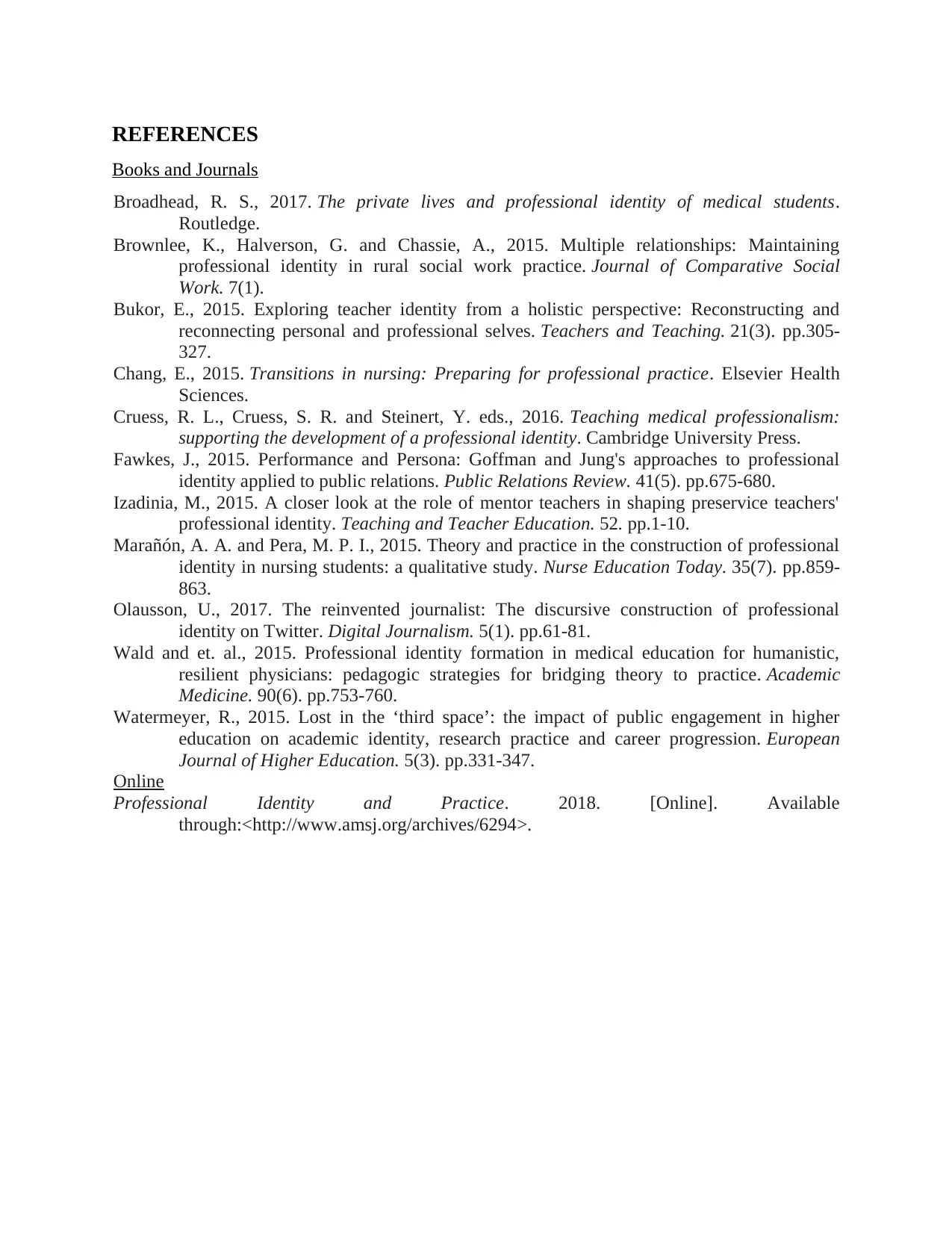
REFERENCES
Books and Journals
Broadhead, R. S., 2017. The private lives and professional identity of medical students.
Routledge.
Brownlee, K., Halverson, G. and Chassie, A., 2015. Multiple relationships: Maintaining
professional identity in rural social work practice. Journal of Comparative Social
Work. 7(1).
Bukor, E., 2015. Exploring teacher identity from a holistic perspective: Reconstructing and
reconnecting personal and professional selves. Teachers and Teaching. 21(3). pp.305-
327.
Chang, E., 2015. Transitions in nursing: Preparing for professional practice. Elsevier Health
Sciences.
Cruess, R. L., Cruess, S. R. and Steinert, Y. eds., 2016. Teaching medical professionalism:
supporting the development of a professional identity. Cambridge University Press.
Fawkes, J., 2015. Performance and Persona: Goffman and Jung's approaches to professional
identity applied to public relations. Public Relations Review. 41(5). pp.675-680.
Izadinia, M., 2015. A closer look at the role of mentor teachers in shaping preservice teachers'
professional identity. Teaching and Teacher Education. 52. pp.1-10.
Marañón, A. A. and Pera, M. P. I., 2015. Theory and practice in the construction of professional
identity in nursing students: a qualitative study. Nurse Education Today. 35(7). pp.859-
863.
Olausson, U., 2017. The reinvented journalist: The discursive construction of professional
identity on Twitter. Digital Journalism. 5(1). pp.61-81.
Wald and et. al., 2015. Professional identity formation in medical education for humanistic,
resilient physicians: pedagogic strategies for bridging theory to practice. Academic
Medicine. 90(6). pp.753-760.
Watermeyer, R., 2015. Lost in the ‘third space’: the impact of public engagement in higher
education on academic identity, research practice and career progression. European
Journal of Higher Education. 5(3). pp.331-347.
Online
Professional Identity and Practice. 2018. [Online]. Available
through:<http://www.amsj.org/archives/6294>.
Books and Journals
Broadhead, R. S., 2017. The private lives and professional identity of medical students.
Routledge.
Brownlee, K., Halverson, G. and Chassie, A., 2015. Multiple relationships: Maintaining
professional identity in rural social work practice. Journal of Comparative Social
Work. 7(1).
Bukor, E., 2015. Exploring teacher identity from a holistic perspective: Reconstructing and
reconnecting personal and professional selves. Teachers and Teaching. 21(3). pp.305-
327.
Chang, E., 2015. Transitions in nursing: Preparing for professional practice. Elsevier Health
Sciences.
Cruess, R. L., Cruess, S. R. and Steinert, Y. eds., 2016. Teaching medical professionalism:
supporting the development of a professional identity. Cambridge University Press.
Fawkes, J., 2015. Performance and Persona: Goffman and Jung's approaches to professional
identity applied to public relations. Public Relations Review. 41(5). pp.675-680.
Izadinia, M., 2015. A closer look at the role of mentor teachers in shaping preservice teachers'
professional identity. Teaching and Teacher Education. 52. pp.1-10.
Marañón, A. A. and Pera, M. P. I., 2015. Theory and practice in the construction of professional
identity in nursing students: a qualitative study. Nurse Education Today. 35(7). pp.859-
863.
Olausson, U., 2017. The reinvented journalist: The discursive construction of professional
identity on Twitter. Digital Journalism. 5(1). pp.61-81.
Wald and et. al., 2015. Professional identity formation in medical education for humanistic,
resilient physicians: pedagogic strategies for bridging theory to practice. Academic
Medicine. 90(6). pp.753-760.
Watermeyer, R., 2015. Lost in the ‘third space’: the impact of public engagement in higher
education on academic identity, research practice and career progression. European
Journal of Higher Education. 5(3). pp.331-347.
Online
Professional Identity and Practice. 2018. [Online]. Available
through:<http://www.amsj.org/archives/6294>.
1 out of 11
Related Documents
Your All-in-One AI-Powered Toolkit for Academic Success.
+13062052269
info@desklib.com
Available 24*7 on WhatsApp / Email
![[object Object]](/_next/static/media/star-bottom.7253800d.svg)
Unlock your academic potential
Copyright © 2020–2026 A2Z Services. All Rights Reserved. Developed and managed by ZUCOL.





